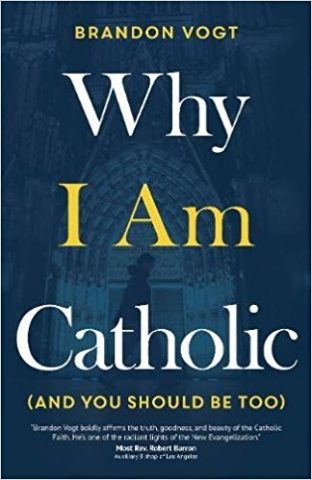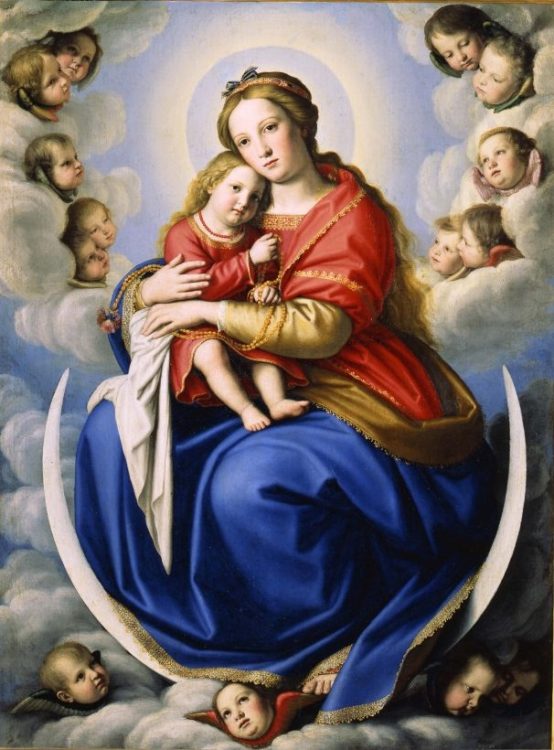“Brandon Vogt’s “Why I Am Catholic (and You Should Be Too” lives up to its cheeky title. It is clear, direct, simple yet not simplistic…. Here is a friendly explanation from a live fish who is swimming happily upstream to the many fish who are passing him in the other direction.” – Peter Kreeft
Brandon Vogt, Catholic Education Resource Center
Anything but Catholic.
Spirituality, great. Religion, fine. Attending church, maybe.
But why in the world would anyone become Catholic today? Isn’t Catholicism a backward, intolerant, bigoted religion? Isn’t it run by pedophile priests and full of scandals? Doesn’t it degrade women and LGBT people and obsess about sex? Isn’t it plagued by pointless rules that stifle real faith?
I was not raised Catholic. Some of my friends must have been Catholic growing up, but I never knew it. I grew up in a Presbyterian church, which provided a warm community and great formation. Yet like many young people, the life of faith never took root in me. This was almost certainly my fault, not the church’s.
As a teenager, I probably would have identified as “spiritual but not religious.” But then in college at Florida State, while studying mechanical engineering, I fell in with a Methodist group on campus, which dramatically affected my faith. I found a deep, vibrant community that welcomed me in. They weren’t afraid of hard questions, and they exposed me to the fascinating world of the Bible. I started praying on my own and began devouring books about God and faith and philosophy.
But then, as a twenty-year-old senior with a budding faith, and on the cusp of graduating, getting married, and starting a new engineering job, I did something few people could fathom, something that didn’t fit with all those other sensible decisions: I became Catholic.
To say friends and family were surprised would be a vast understatement. Most were profoundly confused, and remain so. Though I’ve discussed it often, trying to explain what led me into the Church, it’s still hard for people to understand how a young man with an apparently well-functioning brain would not only look favorably on an institution such as the Catholic Church but also actually choose to join it.
It’s been eight years since I chose to become Catholic. Interestingly, I’ve noted how different the reaction I usually get compares to the reactions that converts to other religions often receive. Admit you’re exploring Buddhism and you’re greeted with wonder and encouragement. Reveal that you’ve become Jewish or Muslim and you’re treated with hushed reverence. Say you’re dedicated to meditation or the power of positive thinking and the “Good for you” comments will stream out as if you lost sixty pounds. Heck, share that you’ve just been baptized at a local nondenominational church and people will congratulate you on such a wonderful milestone.
But admit you’re becoming Catholic? Crickets and confusion.
Choosing to be Catholic is provocative. It’s countercultural. It’s literally the opposite direction our culture is going. The Pew Research Center completed a massive, national religious study, surveying more than thirty thousand Americans, which found that exactly half (50 percent) of millennials who were raised Catholic no longer call themselves Catholic today. That’s massive attrition. Half of young Catholics have already left the Church (with more likely following in the future). That explains why “former Catholic” continues to be one of America’s largest religious groups.
The study also found that roughly 80 percent of people who left the Catholic Church have left before age twenty-three. These aren’t lifelong Catholics who stay on the fence for decades before drifting away. They’re young people, people in high school or college, or young adults — people the same age I was when I chose to become Catholic.
Perhaps most telling, the Pew study revealed something called the “loss-gain ratio.” This is the ratio of people who leave a particular religious tradition divided by the people who join (excluding births and deaths). Ideally, you want your loss-gain ratio to be less than one, meaning your religion is losing fewer people than you’re gaining. Unfortunately, in the latest survey, no Christian group had a loss-gain ratio less than one. In other words, every Christian tradition is losing more people than it’s gaining. But do you know which religious group owned the worst loss-gain ratio of all? Catholicism.
The Catholic Church’s loss-gain ratio was a staggering 6.45. That means for every one person walking in the front door of the Catholic Church, more than six leave through the back door. That’s a worse ratio than Baptists, Evangelicals, Methodists, Mormons, Muslims, Jews, and Hindus — even worse than atheists and agnostics!
The Catholic Church is hemorrhaging people, especially young people. So why be Catholic? Surely anything else would be better, maybe some other form of Christianity, or even a mystical Eastern faith, or perhaps some do-it-yourself spirituality.
But why Catholic? I wrote this book to answer that question.
I’m not part of the 50 percent of millennials who left the Church. I’m not one of the 6.45 who continually stream out the back door. I’m the one who joined. I’m the one who deliberately chose Catholicism, who carefully studied and wrestled with its claims, who prayed, read, thought, and discussed and came out the other end a Catholic.
I’ll admit it’s a weird decision. It goes against the grain.
It’s radical. It is, in a word, rebellious.
But that’s precisely what makes it worth considering (and, dare I say, exciting). It’s easy to swim downstream, to accept the status quo. What’s hard is to be a rebel, to look with fresh eyes on something most people reject and say, “What if they’re mistaken? What if ‘anything but Catholic’ should perhaps be ‘what else but Catholic’?”
These same questions struck G. K. Chesterton. He was one of the most popular and prolific English journalists of the early twentieth century, writing more than a hundred books and more than five thousand essays, and lecturing all over the globe. But in 1922, he stunned the world by announcing his conversion to the Catholic Church. Friends and family were just as confused as mine were almost a century later. They thought this normally straight mind had gone horribly off the rails, asking him accusingly, “Why would you become Catholic?”
Chesterton replied, as was his wont, with an essay. He titled it, plainly, “Why I Am a Catholic,” and he began it by saying, “The difficulty of explaining why I am a Catholic is that there are ten thousand reasons all amounting to one reason: that Catholicism is true.”
That’s a great answer, and it’s mine too. It’s the main reason to accept any belief, philosophy, or worldview. Whether we’re talking about Christianity, evolution, democracy, or atheism, what matters most is that fundamental question: Is it true? Sure, a particular view may make us feel better. Perhaps it puts us in good company or is rooted in our family’s heritage. But ultimately, the best reason to accept any belief is because it’s true. Like Socrates, we should assess the evidence and follow it wherever it leads, even to conclusions that are unpopular or uncomfortable. That’s what truth demands.
Of course, there are other good reasons to believe something. If a belief is true, it’s almost always good and beautiful too. There’s a harmony among these three qualities, what philosophers call the transcendentals. For example, look at science. Even atheist scientists such as Stephen Hawking and Richard Dawkins speak about the elegance and majesty of the universe. The remarkable order we see in nature strikes us not only because it’s true, because it matches our equations, but also because it’s surprisingly beautiful. Similarly, when we see a truly good act, such as a father sacrificing his life to save his son, we recognize the truth of it, that what the father did, for example, was truly the right thing, not just one subjectively good course among many.
Truth, goodness, and beauty are like three notes of a chord, and when they’re played together we know we are hearing something coherent and fulfilling. Or to switch metaphors, they’re like the three codes to a lock. When you turn the dial back and forth, hitting all three codes, the lock clicks, it opens, and you’re welcomed in.
That’s precisely what I found in Catholicism. I discovered that in the Catholic faith these transcendentals do converge, that the Catholic Church is worth considering not because it’s popular, progressive, or comfortable but because it’s true, good, and beautiful. In Catholicism, the locks click and the world opens up.
But this isn’t just a conversion memoir — there are lots of those by much better writers. This book is only partly an explanation of why I decided to become Catholic. Primarily, it’s my appeal to you, why you should consider Catholicism yourself.
As with all appeals, this one requires an open mind. Even just exploring the Catholic Church is an act of rebellion. But again, that makes it exciting.
Today’s world is a simmering pot of rebels. Every night on the news we see fed-up citizens rebelling against dictators. Protesters fill our streets, decrying injustice. Hipsters refuse to conform to the plans of past generations. People are hungry for something radical and revolutionary.
Catholicism offers that. In fact, it’s the only true rebellion left. It’s not rebellious to get drunk, criticize institutions, pursue sex and money, or come out as an atheist. Everyone’s doing that. Those are all mainstream. They’re easy and expected. They may sometimes require a slight bit of courage, but really, everyone is following those paths, swimming along with the current.
What’s truly radical is to consider a Church that billions of people have embraced throughout history but millions of people today dismiss as bigoted and outdated.
Maybe the critics are right. Maybe the Catholic Church is wrong, evil, and ugly, and the few who choose it are deluded.
But perhaps the opposite is true. Maybe in a strange and confused world, the Catholic Church looks so backward because everyone else is facing the wrong direction.
Catholicism used to be respectable. Today it’s not. Choosing to be Catholic is emphatically a countercultural move.
So I invite you, through this book, to carefully consider it, if only in the spirit of rebellion. Venture into this world few people genuinely explore. Refuse to join the herd. Be willing to swim upstream.
Because when you do, you’ll discover that perhaps the Catholic Church really is true, good, and beautiful; that it really is in harmony with our deepest desires; and that it’s the rest of the world that’s singing off key.






 Acknowledgement
Acknowledgement
 Brandon Vogt is a bestselling and award-winning author, blogger, and speaker who serves as content director for Fr. Robert Barron’s Word on Fire Catholic Ministries. Vogt was one of the millennial “nones” when it came to religion until, as a mechanical engineering student at Florida State University, he began a passionate search for truth. That search led him unexpectedly to the Catholic Church in 2008. In 2013, he started
Brandon Vogt is a bestselling and award-winning author, blogger, and speaker who serves as content director for Fr. Robert Barron’s Word on Fire Catholic Ministries. Vogt was one of the millennial “nones” when it came to religion until, as a mechanical engineering student at Florida State University, he began a passionate search for truth. That search led him unexpectedly to the Catholic Church in 2008. In 2013, he started 

